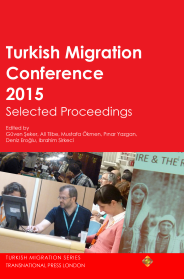European Union and Turkish Migration Policy Reform: From Accession to Policy Conditionality
European Union and Turkish Migration Policy Reform: From Accession to Policy Conditionality
Author(s): Birce Demiryontar
Subject(s): Politics, Geography, Regional studies, Public Law, Policy, planning, forecast and speculation, Migration Studies, EU-Accession / EU-DEvelopment, EU-Legislation
Published by: Transnational Press London
Keywords: EU; Turkey; migration policy; reform; EU accession; conditionality;
Summary/Abstract: The EU typically exerts influence on domestic policy change in Turkey through accession conditionality. The main shortcoming of this reform framework is its interconnectedness to the country’s accession process, when the country’s prospects for membership are losing their credibility. This loss of credibility, leads to a halt in the EU induced policy change, though migration policy area presents a deviation from this trend. In the absence of a credible membership prospect, in 2011, the Law on Foreigners and International Protection was drafted, and ratified by the Parliament on April 2013. Subsequently, in December 2013 Turkey and the EU have signed the readmission agreement in parallel to the introduction of the road-map to visa liberalization. The main reason behind this commitment to the EU induced reform agenda, is the successful detachment of the migration policy area, from the accession conditionality by establishing its own policy conditionality. This paper claims that in the EU accession negotiations where the parties were stuck in a deadlock, persistence in using the accession conditionality as an incentive has been counterproductive. With the visa liberalization road map, the EU introduced an external incentive specific to migration and set a more approachable target than accession, which ensured the sustainability of the reforms.
Book: Turkish Migration Conference 2015 Selected Proceedings
- Page Range: 45-52
- Page Count: 8
- Publication Year: 2015
- Language: English
- Content File-PDF

